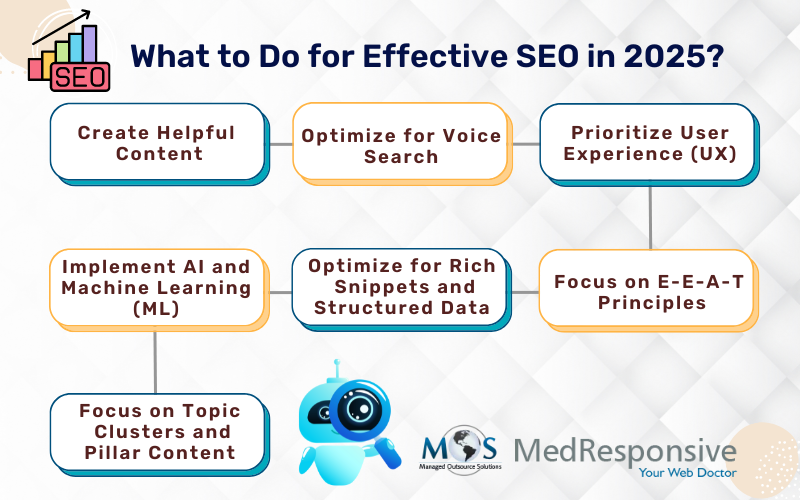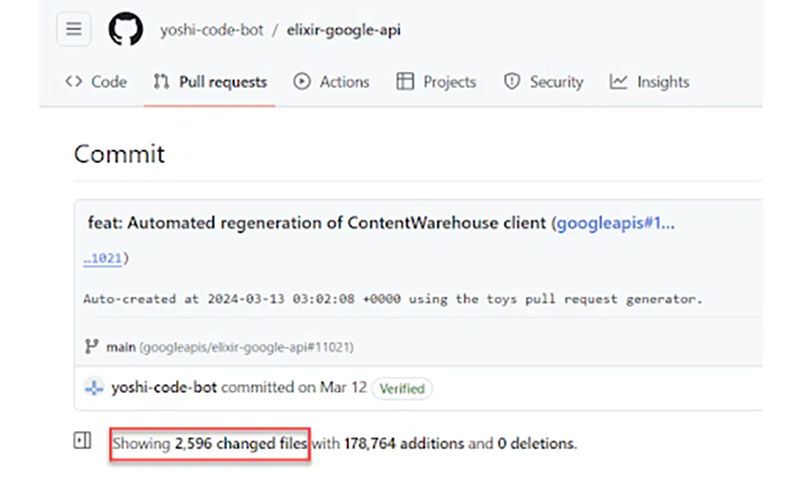Ready to prepare your SEO strategy for 2025? By next year, the landscape of Google SEO is set to undergo significant transformations. From AI-powered algorithms and voice search optimization to video content optimization and search integration, businesses must adapt innovative and effective SEO strategies to align with emerging trends and stay ahead of the competition. If you’re busy with your core business tasks, choose a professional digital marketing services company to keep your website and content up to date with current trends.
Let us take a look at the key SEO trends for 2025.

Key SEO Trends 2025
Focus on content – the king
If content is King, user intent is Queen. Focus on creating high-quality content that (exactly) answers the questions your target audience is asking. Don’t just stuff keywords in; understand the user’s intent behind the search.
Google’s API Content Warehouse documentation was recently leaked on March 13th, 2024 on Github, by an automated bot called yoshi-code-bot. Based on Google Algorithm Leak,
- You need to add authorship to all blog posts. Each post should have a brief author bio at the bottom that includes credentials, social profiles and a link to its author bio section.
- Update the publishing date of content. Readers always prefer up-to-date content, which leads to higher click-through rates (CTR) and better user engagement metrics, which are positive signals for search engines. Update your old content regularly with new information.
Conduct in-depth audience research to understand the specific challenges and pain points your target audience faces. Consider creating content that provides actionable solutions and step-by-step guides to address those challenges. Use data, statistics, and case studies to back up your claims and showcase the effectiveness of your solutions.
Voice search optimization
Optimizing your content for voice queries is getting more important, with the rise of virtual assistants like Siri, Alexa, and Google Assistant. To optimize your content for voice search in 2025, you should mainly speak the user’s language.
People use natural language when searching by voice, so write in a conversational way. Imagine you’re answering a friend’s question.
Also –
- Target Long-tail Keywords: Voice search queries tend to be longer and more specific than typed queries. Include long-tail keywords that answer questions people might ask naturally.
- Answer the Question Directly: Focus on providing clear and concise answers to the questions your content targets. Aim for short, informative answers around 30 words, similar to how voice assistants respond.
- Optimize for Featured Snippets: Featured snippets are those answer boxes at the top of search results. By crafting content that directly answers questions, you can increase your chances of landing a featured snippet and getting your content heard by voice search users.
- Structure for Readability: Use headers, subheadings, and bullet points to break up your text and make it easier for voice assistants to understand and deliver your content.
- Create FAQ Pages: Develop FAQ (Frequently Asked Questions) pages that address common queries related to your industry or niche. This can increase the likelihood of your content being featured as a response to voice search queries.
Above all, ensure your website is mobile-friendly and loads quickly for optimal user experience. These strategies can enhance your content’s visibility and accessibility for voice search users, ultimately improving your chances of attracting organic traffic from voice search queries.
AI and machine learning
AI and machine learning will enhance content optimization by analyzing data to create user-centric content with the right keywords. Predictive capabilities will help target up-and-coming keywords. AI will personalize user experience and automate technical SEO tasks, freeing up human specialists for strategy. This trend is expected to accelerate in 2025, so SEO professionals will need to stay on top of the latest AI developments.
As voice search increases, AI will optimize content for natural language queries. Even link building will benefit from AI’s data-driven approach to identifying high-value link opportunities. However, SEO professionals will remain crucial, using their expertise to use AI tools and navigate the evolving search landscape.
E-E-A-T (Experience, Expertise, Authoritativeness, and Trustworthiness)
E-E-A-T stands for Experience, Expertise, Authoritativeness, and Trustworthiness. It’s a framework that Google uses, not as a direct ranking factor, but to assess the quality of content on a website.
- Experience refers to the real-world knowledge and background of the content creator or the website itself, especially for Your Money or Your Life (YMYL) topics like health, finance, or legal matters.
- Expertise shows that the content creator has a deep understanding of the topic they’re writing about. This can be conveyed through credentials, awards, or simply the comprehensiveness and detail of the content.
- Authoritativeness refers to how well-recognized the website or author is within their field. It can include backlinks from high-quality websites, mentions by other experts, and industry awards.
- Trustworthiness: This is all about how reliable and trustworthy the content and website seem. Google considers factors like positive user reviews, avoiding spammy content, and having a secure website (https) to determine trustworthiness.
Overall, websites with strong E-E-A-T tend to rank higher in search results for relevant queries, especially for YMYL topics. By focusing on creating high-quality content from experienced and credible sources, you can improve your website’s E-A-T and potentially boost your SEO.
Video and Answer Engine Optimization (AEO)
Video and Answer Engine Optimization (AEO) are strategies used to improve the visibility and ranking of video content and answers in search engine results pages (SERPs), respectively. Video optimization involves optimizing video content to improve its search engine ranking and visibility. Key aspects of optimizing video content include:
- Identifying relevant keywords that users are likely to search
- Crafting compelling titles and descriptions that include relevant keywords
- Using appropriate tags and categories to understand the context of the video
- Creating eye-catching thumbnails that entice users to click on the video
- Providing transcripts and closed captions for your videos
Answer Engine Optimization (AEO) focuses on optimizing content to appear as featured snippets or direct answers in search engine results. This is particularly important for voice search and quick answers on platforms like Google, where users are often looking for immediate answers to their queries. Key strategies for AEO include:
- Creating a content structure that directly answers common search queries
- Using schema markup to provide search engines with additional context
- Creating FAQs and Q&A content formats to appear as a featured snippet
- Providing clear, concise answers to the user’s query
These optimization strategies can improve the visibility and accessibility of video content and answers, ultimately driving more traffic and engagement to your websites or platforms.
Other continuing trends which you can’t ignore include building niche authority, optimizing internal links, and keeping up with the latest search engine ranking features. Need professional support with digital marketing services? Get in touch with MedResponsive for a customized solution.





